Crescent Sustainability Initiatives
Quality Education (SDG 4)
Fostering Community Connection Through Educational Outreach
B.S. Abdur Rahman Crescent Institute of Science and Technology (BSACIST) has strongly committed to educational outreach by organizing competitions for school children in adopted villages during the 76th Independence Day celebrations. This initiative promotes inclusive education and strengthens the university’s support for early learning and community development. By extending educational activities beyond campus, the university effectively breaks down barriers between higher education institutions and local communities, fostering meaningful connections that inspire young learners. Integrating educational competitions with Independence Day celebrations enhances the learning experience while connecting it to national pride and cultural heritage. This thoughtful approach not only makes the outreach more impactful but also allows university students involved in organizing these activities to serve as role models, potentially motivating younger students from the villages to pursue higher education. The culmination of the competitions in an award ceremony on campus provides a significant opportunity for the winning students. By inviting them to the university, BSACIST creates a tangible connection between young learners and higher education, helping them visualize themselves in such settings. This exposure can break multi-generational barriers to educational advancement and serves as a powerful motivational tool for aspiring students. This comprehensive outreach program exemplifies how universities can support early education while fostering lifelong learning aspirations. By creating educational opportunities in adopted villages, BSACIST is dedicated to reducing educational inequalities and enhancing access to quality educational experiences, ultimately building a stronger, more educated community equipped to face future challenges.Empowering Local Schools with Technology
In a notable initiative, BSACIST distributed computers to primary school children in the adopted villages of Keerapakkam and Karasangal on September 12, 2022. This event, attended by university officials and local leaders, underscores the university’s commitment to improving educational resources in underserved areas and bridging the digital divide. The distribution of computers is a significant step toward enhancing learning opportunities for young students. By providing access to technology, BSACIST equips children with essential tools for education and fosters digital literacy skills crucial for their future academic and professional endeavours. In addition to computer distribution, BSACIST’s outreach includes tailored lectures and demonstrations conducted by students and faculty in local schools. These voluntary initiatives aim to engage the community through interactive learning experiences that address specific educational needs, fostering a collaborative learning environment that benefits both students and community members. Through these outreach activities, BSACIST exemplifies how academic institutions can play a vital role in community empowerment and development. By extending educational initiatives beyond the campus, the university strengthens its ties with the community and ensures that education remains accessible and relevant, contributing to a more informed and capable society.Fostering Community Connection
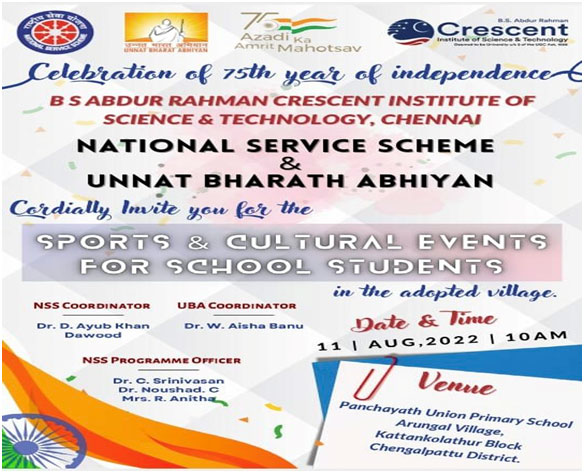
Figure IV (3.4) –1: Celebration of 75th Year of Independence
The B.S.A. Crescent Institute of Science and Technology, through its National Service Scheme (N.S.S.) and Unnat Bharat Abhiyan (U.B.A.) initiatives, demonstrated exemplary commitment to educational outreach by organizing competitions for school children in their adopted villages as part of the 76th Independence Day celebrations. This initiative inclusive education and the university’s role in supporting early years learning and community development. By extending educational activities beyond campus boundaries, the institution actively works to break down barriers between higher education institutions and local communities, creating meaningful connections that can inspire and motivate young learners.
The strategic decision to integrate educational competitions with Independence Day celebrations showcases a thoughtful approach to community engagement. This combination not only enhances the learning experience but also connects it with national pride and cultural heritage, making the educational outreach more impactful and memorable for the participating school children. The involvement of university students through N.S.S. and U.B.A. in organizing these activities creates a valuable mentorship dynamic, where university students serve as role models for younger students from the adopted villages, potentially inspiring them to pursue higher education.
The culmination of these competitions in an award ceremony during the Independence Day event on campus on August 15 adds another significant dimension to the initiative. By inviting the winning students to the university campus, the institution creates a tangible connection between these young learners and higher education. This exposure to the university environment can be transformative, helping students from adopted villages visualize themselves in higher education settings and potentially breaking multi-generational barriers to educational advancement. The prize distribution ceremony serves not just as a recognition of achievement but as a powerful tool for motivation and aspiration-building among young learners.
This comprehensive outreach program exemplifies how universities can effectively support early years’ education while fostering lifelong learning aspirations. By creating these educational opportunities in adopted villages, the university is committed to reducing educational inequalities and providing access to quality educational experiences beyond its immediate campus community. This approach not only enhances the quality of education in the adopted villages but also helps build a stronger, more educated community that is better equipped to address future challenges.
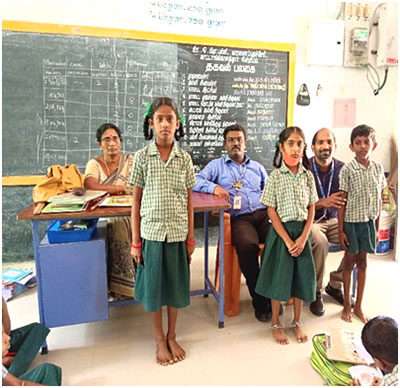
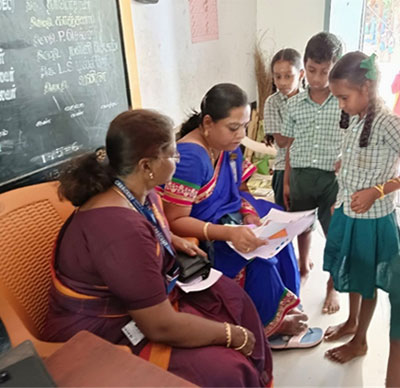

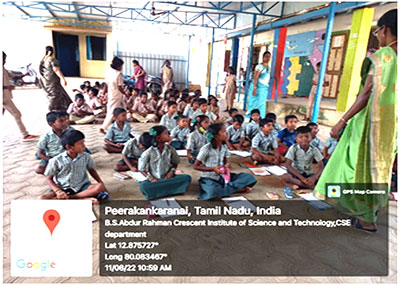
Figure IV (3.4) –2: Educational outreach by organizing competitions for school children
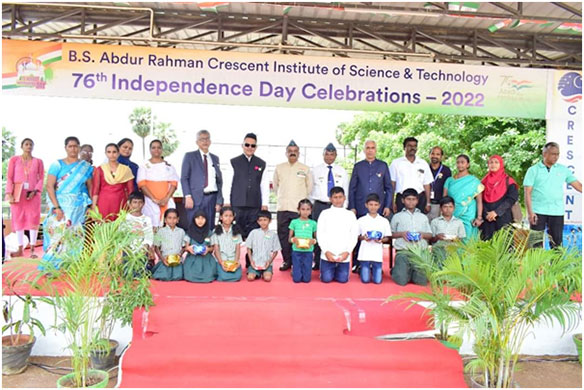
Figure IV (3.4) –3: Awarding Ceremony @ Crescent Campus
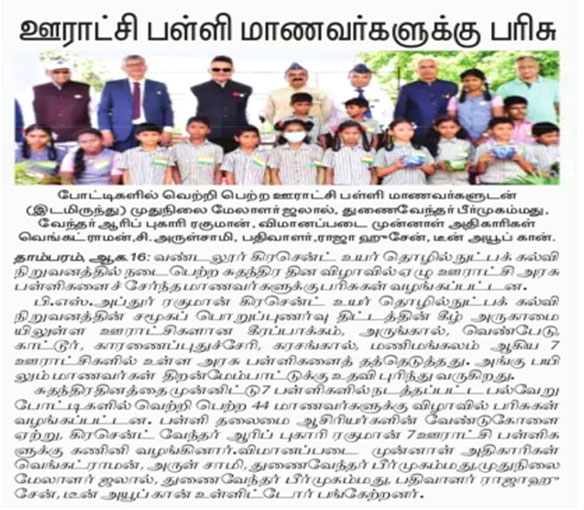
Figure IV (3.4) –4: Newspaper Coverage
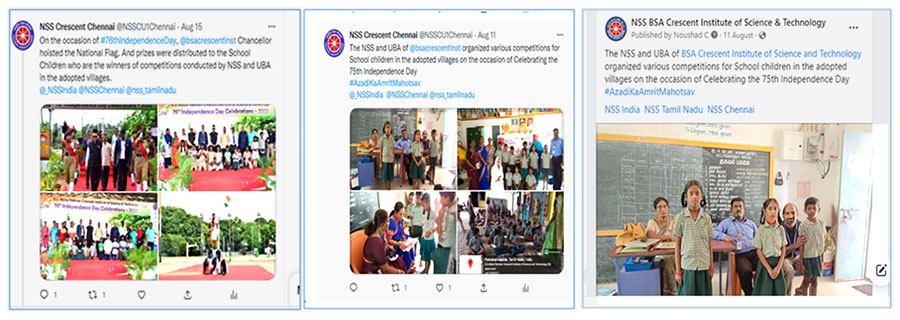
Figure IV (3.4) –5: Independence Day Celebration
Empowering Local Schools through Educational Outreach Initiatives by BSACIST: Fostering Lifelong Learning in the Community
Commitment to Community Development through Educational Outreach
B.S. Abdur Rahman Crescent Institute of Science and Technology (BSACIST) has actively engaged in educational outreach activities beyond its campus, demonstrating a commitment to community development and the enhancement of local education. A notable initiative involved distributing computers to primary school children in the adopted villages of Keerapakkam and Karasangal on September 12, 2022.
This event, presided over by the Honourable Vice Chancellor, Dr A. Peer Mohamed, alongside Dr Raja Hussain, the Registrar of BSACIST, and local panchayat leaders, underscores the university’s dedication to improving educational resources in underserved areas.
Bridging the Digital Divide for Enhanced Learning Opportunities
The distribution of computers is a significant step in bridging the digital divide and enhancing learning opportunities for young students in these villages. By providing access to technology, BSACIST equips children with essential tools for their education and fosters an environment where they can develop digital literacy skills crucial for their future academic and professional endeavours.
This initiative reflects the university’s understanding of integrating technology into education, particularly in rural settings with limited resources.
Engaging the Local Schools through Tailored Computer Educational Initiatives
In addition to the computer distribution, BSACIST’s outreach efforts include tailored lectures and demonstrations conducted by students and faculty in local schools. These voluntary student-run schemes aim to engage the community through interactive learning experiences that address specific educational needs. By bringing knowledge and expertise directly to the local population, the university fosters a collaborative learning environment that benefits students and community members, enhancing the overall educational landscape. Through these outreach activities, BSACIST exemplifies how academic institutions can play a vital role in community empowerment and development.
The university fulfils its mission of promoting lifelong learning by extending educational initiatives beyond the campus. It strengthens its ties with the community, ensuring that education remains accessible and relevant. Such efforts contribute to building a more informed and capable society, highlighting the transformative power of education in fostering positive change.
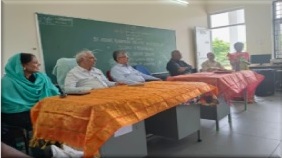
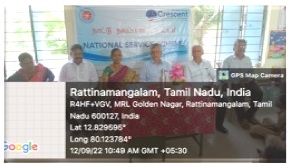
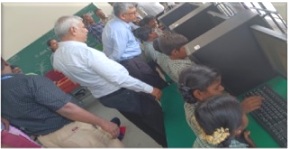
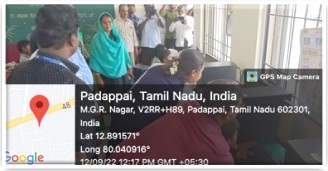
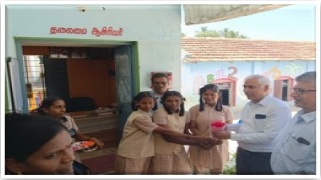
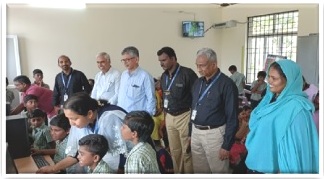
Figure IV (3.4) –6: Empowering Young Minds: BSACIST’s Educational Outreach Initiative in Padappai and Rattinamangalam – Distributing Computers and Enhancing Learning Opportunities for Local Schools
Policy for Life-Long Learning Access
Policy Document
Issue : 04; Revised on 2023
| Policy Created on | July 2009 |
| 1st Revision amended on | IQAC Meeting held on 27th October 2017 |
| 2nd Revision amended on | IQAC Meeting held on 31st March 2021 |
| 3rd Revision amended on | IQAC Meeting held on 16th June 2023 |
Responsible Executive : Director (IQAC)
Responsible Office : Internal Quality Assurance Cell, Student Affairs, Estate Office, Academic Office, Library and SDG Cell
Contacts : Registrar, Director (IQAC)
The revised policy has been approved in the 18th Meeting of the Internal Quality Assurance Cell (IQAC) held on 16.06.2023.
1. Statement of Policy
The B.S. Abdur Rahman Crescent Institute of Science and Technology is committed to ensuring inclusive and equitable quality education and promoting lifelong learning opportunities for all. This policy aims to enhance access to educational resources and foster a culture of continuous learning, aligning with the United Nation’s Sustainable Development Goal 4 (SDG 4).
2. Objectives
- Equitable Access: Ensure that all individuals, regardless of gender, socio-economic background, race, religion, or disability, have access to quality education and lifelong learning opportunities.
- Community Engagement: Actively involve the local community in educational initiatives, promoting awareness and participation in lifelong learning programs.
- Resource Availability: Provide free access to educational resources, including libraries, digital materials, and workshops, to facilitate continuous learning.
3. Policy Principles
- Lifelong Learning Opportunities: The Institute will offer a range of programs, workshops, and resources aimed at enhancing skills and knowledge for individuals of all ages.
- Inclusivity: All educational initiatives will be designed to be accessible to diverse populations, including marginalized and underrepresented groups.
- Public Engagement: The Institute will extend its facilities and resources to the community, ensuring that educational opportunities are available to all.
4. Lifelong Learning Measures
4.1 Public Resources (Lifelong Learning)
- Access to Campus Facilities: The Institute will provide free access to its facilities, including libraries, computer labs, and meeting spaces, for community members and local organizations.
- Special Coaching Programs: Organize coaching sessions for higher secondary students, focusing on subjects requested by local schools, conducted in both on-site and online formats.
4.2 Workshops and Training Programs
- Vocational Training Events: Conduct workshops on relevant topics, such as technology, legal awareness, and design, to enhance practical skills and knowledge in the community.
- Collaborative Learning: Encourage partnerships with local schools and organizations to facilitate educational outreach and skill development initiatives.
4.3 Online Resources and Open Access
- Digital Learning Materials: Provide open access to educational materials, including video lectures, course notes, and research papers, to promote self-directed learning.
- Online Courses: Develop and offer online courses that cater to various interests and skill levels, ensuring accessibility for all learners.
4.4 Community Engagement Initiatives
- Educational Outreach Activities: Organize events and competitions for local school children, fostering a connection between higher education and the community while promoting early learning.
- Legal Aid and Awareness Programs: Offer legal education and resources to community members, ensuring access to justice and legal knowledge.
5. Monitoring and Evaluation
The effectiveness of the lifelong learning measures will be regularly assessed through participant feedback and community engagement metrics. Adjustments will be made based on evaluations to improve the policy’s impact continuously.
This revised policy document reflects the commitment of B.S. Abdur Rahman Crescent Institute of Science and Technology to promote lifelong learning and educational equity. By implementing these measures, the Institute aims to empower individuals and communities, contributing to the broader goals of sustainable development and social welfare.


